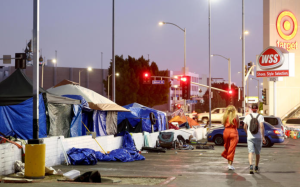In a groundbreaking initiative, approximately 100 homeless individuals in Los Angeles County and the San Francisco Bay Area were provided with $750 monthly for a year, requiring no strings attached. The initial six-month results of this study, exploring the impact of basic income and social support intervention, shed light on how recipients utilized this financial assistance.

The findings add to the growing body of evidence supporting the efficacy of basic-income plans. After six months, those who received the $750 monthly stipend were notably less likely to report being unsheltered. Moreover, they expressed a greater proximity to having enough money to meet their basic needs compared to a control group relying on conventional homeless services.
Conducted by the San Francisco nonprofit Miracle Messages in collaboration with the University of Southern California Suzanne Dworak-Peck School of Social Work, the study revealed intriguing insights into spending patterns. Notably, 36.6% of the stipend recipients allocated the highest share to food during the initial six months. On average, participants reported spending nearly 20% on housing, 12.7% on transportation, 11.5% on clothing, 6.2% on healthcare, and 13.6% on miscellaneous expenses.
Contrary to stereotypes, only about 2% of the $750 monthly sum was spent on alcohol, cigarettes, or drugs, with the majority of that expenditure directed toward cigarettes. Ben Henwood, the director of the Center for Homelessness, Housing, and Health Equity Research at USC Suzanne Dworak-Peck School of Social Work, emphasized that the study dispels the myth that people would misuse the money for illicit purposes.
The study featured testimonials from recipients, highlighting how the funds were used responsibly. Some used the cash to catch up on bills or address essential car repairs, while others allocated a significant portion to purchase food.
For those who received the financial aid, the proportion of individuals reporting being unsheltered dropped from 30% at the start of the trial to under 12% at the six-month follow-up. In comparison, the control group’s rate of those being unsheltered slightly decreased from 28% to 23%.
Researchers plan to publish a follow-up report based on a full year of data, providing a more comprehensive understanding of the long-term impact of the initiative. This California experiment aligns with a broader trend of basic-income experiments showcasing positive outcomes, with similar projects in Durham, North Carolina, Denver, and Stockton, California, yielding increased employment and housing rates for recipients.
Read Also – Texas Has Seven of the Most Absurd Holiday Laws
